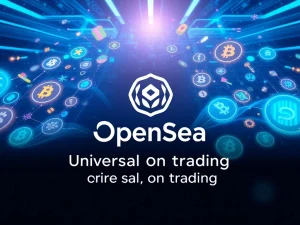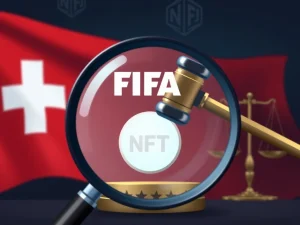Urgent Alert: NFT OTC Scams Skyrocket Amid Market Resurgence

The vibrant world of non-fungible tokens (NFTs) is once again buzzing with activity. After a period of quiet, the NFT market resurgence is undeniable, drawing in new enthusiasts and seasoned collectors alike. However, with this renewed energy comes a dark undercurrent: a sharp increase in NFT OTC scams. As buyers and sellers increasingly turn to over-the-counter (OTC) trades for their flexibility and privacy, scammers are seizing the opportunity to exploit the less regulated nature of these direct transactions. Understanding these evolving threats is crucial for anyone navigating the exciting yet treacherous waters of digital asset ownership.
Understanding OTC Trading: Why the NFT Market Resurgence is Fueling Direct Deals
Over-the-counter (OTC) trading in the NFT space refers to private transactions conducted directly between two parties, bypassing traditional public marketplaces like OpenSea or Blur. This method has gained significant traction during the current NFT market resurgence for several compelling reasons:
- Flexibility in Pricing: Parties can negotiate custom prices, often allowing for deals slightly above or below floor prices, or even complex asset swaps that aren’t easily facilitated on automated marketplaces.
- Privacy: OTC deals offer a degree of anonymity, as transaction details are not immediately public on a marketplace’s interface, though they remain on the blockchain.
- Access to Specific Assets: For high-value or rare NFTs, direct negotiation might be the only way to acquire a desired piece without triggering large market movements or paying high platform fees.
- Avoiding Platform Fees: While some OTC desks or escrow services might charge a fee, direct peer-to-peer trades can potentially reduce or eliminate the fees associated with major marketplaces.
However, this perceived freedom comes with substantial risks. Unlike public exchanges, which offer a layer of transparency, dispute resolution mechanisms, and often escrow services, OTC transactions are largely unregulated. They frequently occur in private channels like Discord, Telegram, or direct messages on social media platforms, creating a fertile ground for malicious actors. This environment is precisely where the surge in NFT OTC scams is occurring.
The Alarming Rise of NFT OTC Scams: Common Tactics and Red Flags
The current wave of NFT OTC scams echoes strategies seen as far back as 2021, but with increased sophistication. Scammers are exploiting the trust-based nature of direct deals, leading to millions in potential losses for unsuspecting traders. Here are the primary tactics they employ:
Phishing and Malicious Platforms: A Digital Deception
One of the most prevalent forms of NFT OTC scams involves directing victims to fake websites or newly created, malicious OTC platforms. These sites are meticulously designed to mimic legitimate marketplaces or trading interfaces, complete with familiar branding, user interfaces, and even fake transaction histories.
- Fake Links: Scammers often send links to these fraudulent sites via private messages, claiming they are for ‘secure’ trading, verification, or even to ‘deposit’ NFTs before a trade.
- Wallet Drainers: Once a user connects their crypto wallet to these fake platforms, the site’s underlying code is designed to automatically drain all connected assets – not just the NFT intended for trade, but often all cryptocurrencies and other NFTs in the wallet.
- Deceptive Verification: Some fake platforms might prompt users to ‘verify’ their wallet by entering their seed phrase or private key, which immediately grants the scammer full access to their funds.
Impersonation and Social Engineering: Building False Trust
Scammers are masters of social engineering. They infiltrate NFT communities, posing as credible, established participants or even well-known collectors and traders. Their goal is to build a rapport and trust with potential targets over days or weeks.
- Trust Building: They might engage in general discussions, offer advice, or even participate in legitimate community activities to establish a reputation.
- Deceptive Offers: Once trust is established, they’ll approach a target with an enticing OTC offer – perhaps slightly above the floor price for an NFT the victim owns, or a seemingly great deal on an NFT the victim desires. This slight ‘edge’ is often used to make the offer seem legitimate and too good to pass up.
- Pressure Tactics: After an agreement is made, the scammer will often create a sense of urgency, pressuring the victim to complete the trade quickly, often citing ‘technical issues’ with established services or claiming they need to move funds urgently. This urgency is a key red flag, designed to prevent the victim from performing due diligence.
These tactics highlight why vigilance and skepticism are paramount in the current environment, especially with the heightened activity spurred by the NFT market resurgence.
Navigating the Risks: Enhancing Your Digital Asset Security
Given the sophisticated nature of NFT OTC scams, proactive measures are essential to protect your valuable digital assets. Effective crypto fraud prevention strategies can make all the difference between a successful trade and a devastating loss.
Verify, Verify, Verify: Your First Line of Defense
The golden rule in any crypto transaction, especially OTC, is to verify every detail independently. Never rely solely on information or links provided by the other party.
- Official Platforms Only: Always initiate and complete transactions through official, well-known NFT marketplaces or trusted OTC desks. If a private messenger provides a link, *do not click it*. Instead, manually type the URL of the official platform into your browser.
- Confirm Asset Ownership: Before agreeing to a trade, verify the ownership and authenticity of the NFT. Log directly into the marketplace (e.g., OpenSea, LooksRare) and search for the NFT’s contract address or ID. Ensure it’s the legitimate collection and that the seller truly owns the NFT.
- Use Trusted OTC Tools: While less common for direct peer-to-peer trades, some platforms offer escrow services or multi-signature wallets designed for secure OTC transactions. Research and use only well-vetted, reputable tools if available for your specific trade type.
The Dedicated Wallet Strategy: Limiting Exposure
One of the most effective ways to enhance your digital asset security during OTC trades is to compartmentalize your holdings. This strategy minimizes potential losses if you fall victim to a scam.
- Separate Wallet for Trades: Maintain a dedicated crypto wallet specifically for OTC transactions. This wallet should only hold the NFTs or cryptocurrency intended for the current sale or purchase.
- Minimal Holdings: Do not keep your entire NFT collection or a large amount of cryptocurrency in this ‘trading wallet.’ Transfer only the necessary assets just before the transaction.
- Hardware Wallets: For your primary collection and larger sums, always use a hardware wallet (e.g., Ledger, Trezor). These devices provide the highest level of security by keeping your private keys offline.
Spotting Red Flags: Early Warning Signs of Crypto Fraud Prevention
Scammers often employ specific behaviors that can serve as warning signs. Being aware of these can significantly boost your crypto fraud prevention efforts.
- Urgent Requests: Any pressure to act quickly, or claims of ‘time-sensitive’ deals, should immediately raise suspicion. Legitimate traders understand the need for due diligence.
- Unfamiliar Platforms: Insistence on using an unknown or newly created platform for the trade, especially if it looks slightly off or requires unusual permissions, is a major red flag.
- Claims of Technical Issues: Scammers might claim their usual platform is having ‘technical issues’ and insist on an alternative, often malicious, method.
- Too Good to Be True Offers: While OTC deals can offer slight advantages, an offer that seems unbelievably good is almost always a scam.
- Requests for Seed Phrase/Private Key: NEVER share your seed phrase or private key with anyone, under any circumstances. No legitimate platform or person will ever ask for this.
By remaining vigilant and adhering to these best practices, you can significantly reduce your vulnerability to NFT OTC scams and ensure your journey in the burgeoning NFT space remains a positive one.
Protecting Your Investment: A Call for Crypto Fraud Prevention
The increasing popularity of OTC trading, fueled by the NFT market resurgence, underscores a critical need for enhanced personal digital asset security. While the allure of direct deals and custom negotiations is strong, the absence of regulated intermediaries places a greater burden of responsibility on individual traders. Every click, every link, and every interaction must be viewed through a lens of skepticism.
The digital frontier of NFTs is dynamic and exciting, offering unprecedented opportunities for creators and collectors. However, it also attracts bad actors seeking to exploit trust and enthusiasm. By prioritizing education, adopting robust security practices, and staying informed about the latest scam tactics, you empower yourself to navigate this landscape safely. Remember, the best defense against NFT OTC scams is a well-informed and cautious approach.
The ongoing battle against crypto fraud is a collective effort. Share your experiences, report suspicious activities, and contribute to a safer environment for everyone passionate about digital assets. Your vigilance today helps secure the future of the NFT ecosystem.
Frequently Asked Questions (FAQs) About NFT OTC Scams
1. What exactly is an NFT OTC trade?
An NFT OTC (Over-The-Counter) trade is a private transaction for NFTs conducted directly between a buyer and a seller, bypassing traditional public marketplaces. It allows for direct negotiation on price, terms, and asset swaps, offering more flexibility than standard marketplace listings.
2. Why are NFT OTC scams more prevalent now?
The recent NFT market resurgence has brought increased trading volumes and new participants. Scammers exploit the less regulated, private nature of OTC trades, which often occur on messaging apps (Discord, Telegram) where transparency and official safeguards are minimal, making it easier to deceive users.
3. What are the most common types of NFT OTC scams?
Common types include phishing scams (directing users to fake websites that drain wallets), impersonation scams (scammers posing as legitimate traders to build trust), and fake platform scams (luring victims to malicious sites designed to steal assets or private keys).
4. How can I verify an NFT’s authenticity during an OTC trade?
Always verify the NFT’s authenticity by manually navigating to the official marketplace (e.g., OpenSea) or a reputable blockchain explorer. Search for the NFT’s contract address and token ID to confirm it belongs to the legitimate collection and is indeed owned by the seller. Never trust links provided by the seller directly.
5. Are there any platforms or tools that can make OTC trading safer?
While direct peer-to-peer OTC trades carry inherent risks, some reputable OTC desks or escrow services exist that can facilitate safer transactions for high-value assets. Always research and verify the legitimacy of any such service thoroughly. Using a hardware wallet for your main assets and a separate, ‘burner’ wallet for trades can also limit exposure.
6. What should I do if I suspect I’ve been targeted by an NFT OTC scam?
If you suspect a scam, immediately cease all communication with the suspicious party. Do not click any links or connect your wallet to unfamiliar sites. If you have already connected, disconnect your wallet immediately and consider transferring your assets to a new, secure wallet if you believe your current one is compromised. Report the scammer to the platform they used (e.g., Discord, Telegram) and consider reporting it to relevant blockchain security communities or authorities if significant funds are involved.








